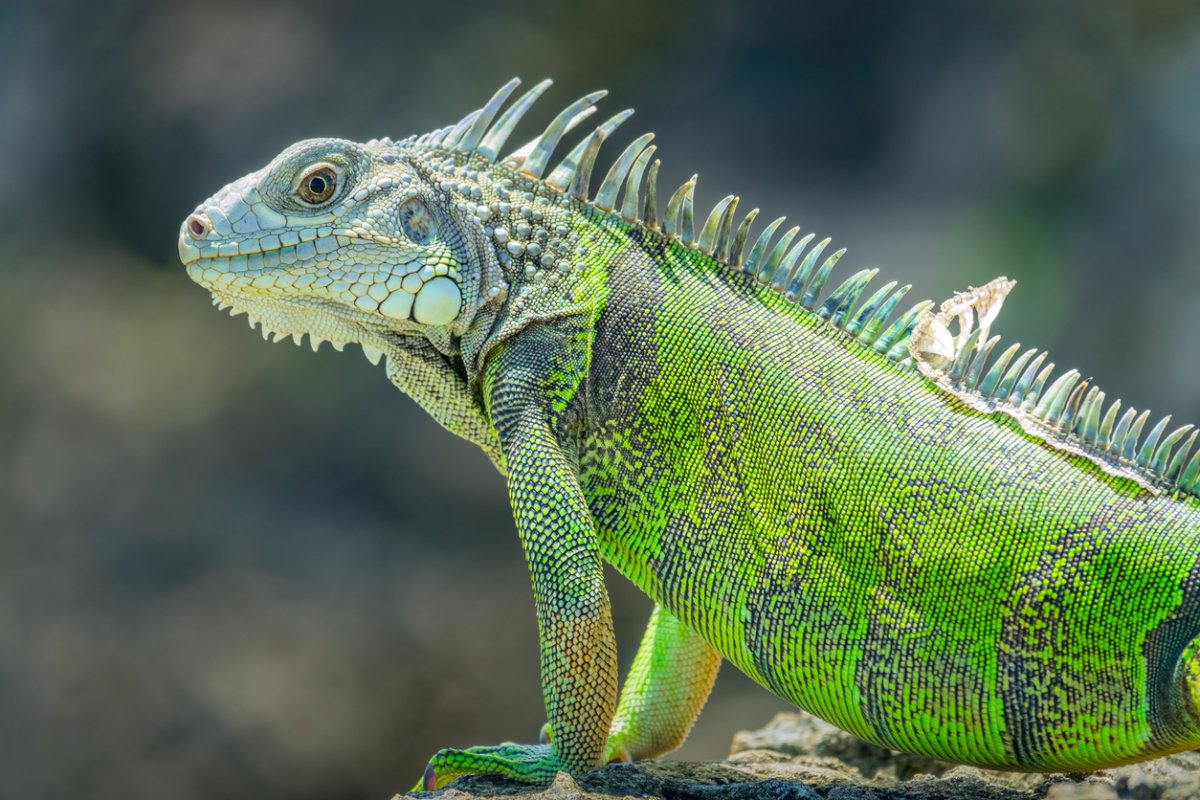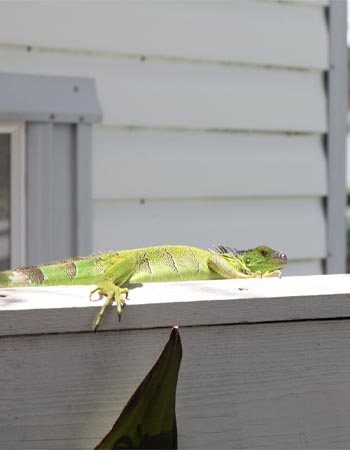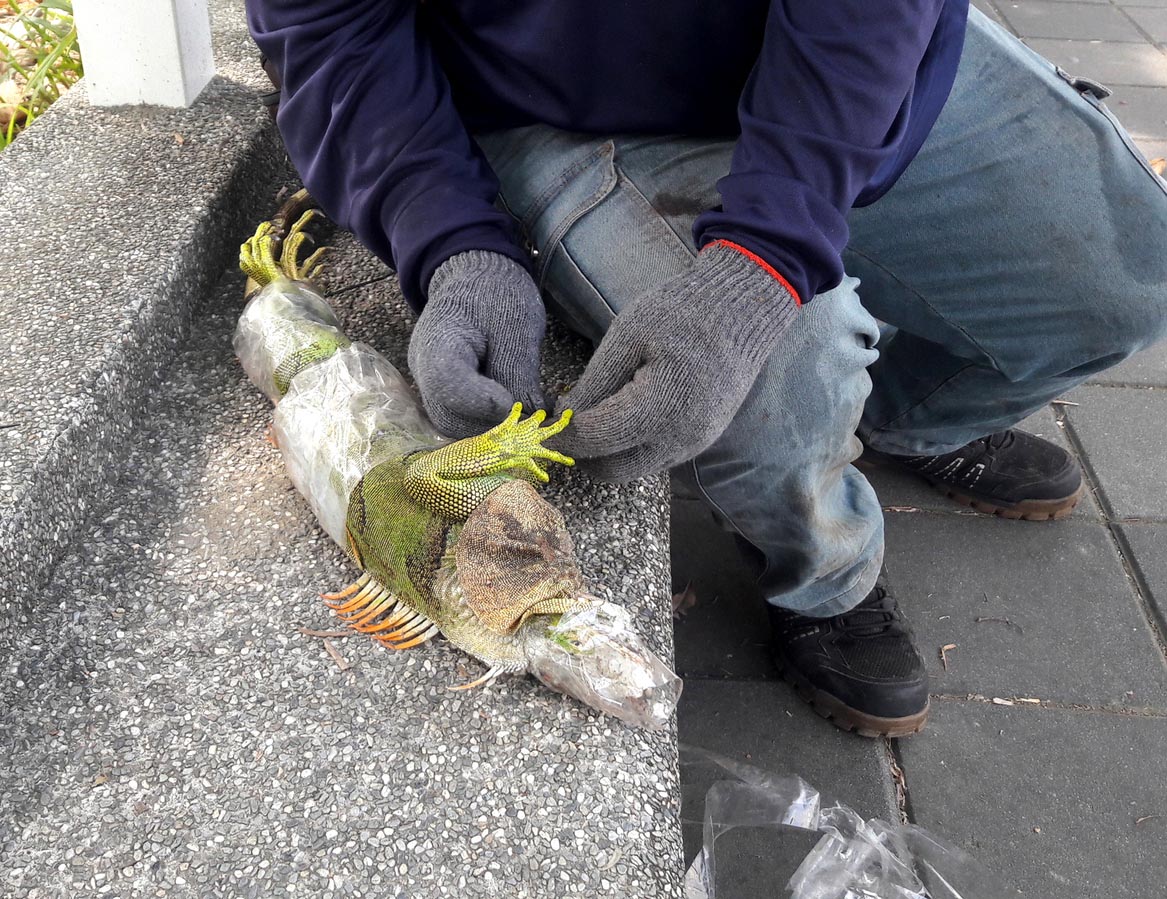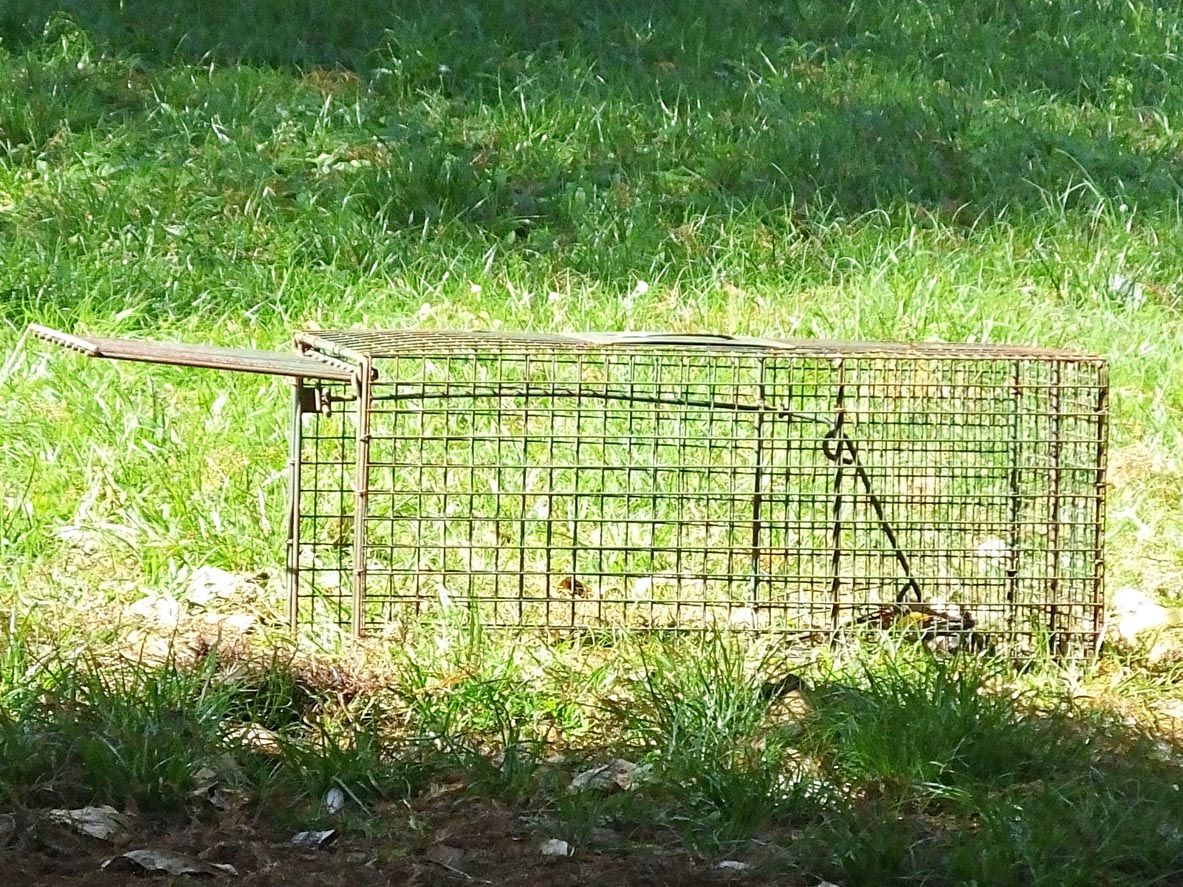

We may earn revenue from the products available on this page and participate in affiliate programs. Learn More ›
Project Overview
- Iguanas are invasive in the southern U.S. and can do significant damage to lawns and gardens.
- It’s important to use caution when dealing with iguanas since they can carry disease and have the potential to become aggressive when threatened.
- DIY methods for getting rid of iguanas include removing attractants like leaf piles and food scraps, filling holes and burrows, wrapping trees with sheet metal or film, applying deterrent scents or sounds, and installing fencing.
- Iguana traps may be used as a last resort with the help of a wildlife removal specialist.
Green iguanas are an invasive species that is particularly prevalent in southern Florida. For those living in areas with large populations of these pests, knowing how to get rid of iguanas may be necessary to protect their yards and themselves from these large reptiles. There are a variety of DIY strategies to keep iguanas out of the yard. These include eliminating anything attracting iguanas (such as debris or food scraps), filling in holes where iguanas could burrow, and wrapping trees to prevent iguanas from climbing and nesting in them. Additional measures include putting out foods or plants that deter iguanas, playing noises to startle them, or installing chicken wire fencing to keep them out. But generally speaking, iguana trapping and removal is best left to one of the best wildlife removal services (such as Critter Control or Trutech).
Tools & Materials
Bobvila.com may earn a commission from purchases made through these links.
Why Iguanas Are a Nuisance

According to Derrick Clay, district manager at Trutech Wildlife Services in Jacksonville, Florida, “Iguanas are considered a nuisance because they destroy gardens and landscape ornamentals. They also leave their droppings, which is a mess and spreads diseases. Iguanas can dig burrows under sidewalks, foundations, seawalls, [and] canal banks, which can lead to these structures collapsing.”
Iguanas can live for 10 years or more in the wild, giving them plenty of time to reach their potential size of 5 feet long and up to 17 pounds. Because of their size, powerful tails, and claws, not to mention their tendency to dig burrows and eat flowers and plants, iguanas are undesirable guests in the yard. Iguanas also climb trees, and in cold weather they may even become immobile and fall to the ground.
They can also be dangerous; they can be defensive if they’re handled or approached and can try to claw or tail whip. Males may also become aggressive during mating season. While uncommon, they may bite to defend themselves if they feel threatened. Because their teeth are sharp and serrated, iguana bites can be quite dangerous.
Before You Begin…
Whenever possible, getting rid of iguanas is best done humanely. While they’re not a protected species in Florida, where they are most prevalent, they are covered under anti-cruelty laws. The best way to handle iguana control is often to simply discourage them from taking up residence in the yard at all.
If you spot an iguana on your property, keeping a sizable distance is wise. If iguanas, especially males, feel threatened, they can become aggressive. Learning how to deter iguanas can help keep one or two of them off your property, but if you do end up with an iguana infestation, it’s best to call in a professional. Beyond being a nuisance, iguanas leave their droppings behind, which is unsanitary. Since the droppings can carry salmonella, it’s important to be aware of the presence of iguana feces and avoid it.
Tips for Getting Rid of Iguanas
- Refer to local trapping or anti-cruelty laws before starting with iguana control or removal.
- Make the yard less attractive by removing any piles of rocks or branches, food scraps, and desirable plants such as hibiscus and roses.
- Use loud noises to scare them off.
- Make trees hard to climb by wrapping them in sheet metal.
- Add plants to your yard that act as a repellent for iguanas, or apply one of the best lizard repellents.
Safety Considerations
- Iguanas can become aggressive if they feel they’re in danger, so it’s best not to handle them.
- Avoid getting too close to iguanas or their droppings, as they may carry diseases like salmonella.

8 Strategies for Iguana-Proofing Your Yard
Iguanas aren’t the average common garden pest. They can be very large, and their claws and tails pose a danger for homeowners trying to remove them from the yard. Because of this, it’s not recommended to physically remove them from the yard without the help of a professional. However, iguana-proofing the yard can be an effective way to deal with unwanted iguanas.
1. Keep the lawn tidy, and remove any debris like leaf piles so that iguanas have nowhere to hide.
In some cases, getting rid of lizards in the yard is as simple as tidying up. Iguanas love to hide in dark, quiet places such as piles of leaves, rocks, or branches. Removing this type of debris can make the yard less desirable since it eliminates all potential hiding places. Iguanas also enjoy open areas where they can bask in the sun, so getting rid of debris may not totally take care of the problem. It can, however, make their presence more obvious and possibly make it easier to startle them away.
2. Avoid leaving garbage, food scraps, or pet food out in the open, as these can attract iguanas to the yard.
Iguanas are herbivores, which means they’ll likely munch on whatever flowers and plants are available—but that’s not all they’ll eat. While summer evenings are great for eating meals outdoors, if food scraps are not cleaned up afterward, they can attract iguanas. Sugar is not a common component of iguanas’ diet in the wild, but it’s not poisonous, and they are particularly attracted to sugary food items that happen to be left unattended. Iguanas may also want to explore the garbage cans for any tasty scraps, so make sure the lid is tightly secured on the garbage can and that pet food is brought inside when pets are not outdoors.
3. Fill holes and gaps around the property with rocks to prevent iguanas from burrowing.
If you’re wondering what animal is digging holes in your yard, the answer may be an iguana. Iguanas create burrows for safety and shelter. While they often sleep in trees, if they can’t find a tree, they will also sleep in burrows or other crevices. They will dig their own burrows, but they will also take shelter in other gaps around the property, including culverts or drainage pipes. Using a small shovel to fill any holes or gaps around the property with rocks can discourage iguanas from getting too comfortable. In addition to deterring iguanas, filling holes can also reduce the risk of anyone tripping or injuring themselves by accidentally stepping in one of them.
4. Wrap trees with plastic or sheet metal so that iguanas aren’t able to climb them.
Iguanas like to sun themselves and even sleep in trees. They especially love climbing fruit trees to get access to sweet treats. Iguanas in trees become particularly problematic in the winter, when cold temperatures cause them to become temporarily paralyzed. In this state, which is called “torpor,” they have the potential to fall from trees, which is alarming at best and dangerous at worst.
To deter iguanas from climbing trees in the first place, plastic or sheet metal wrap can be placed around trees, palms, and dock pilings so iguanas aren’t able to climb them. This can make the yard as a whole less desirable because they won’t have the option to retreat to trees or other high places for safety.
5. Plant iguana-repellent plants such as citrus trees or oleander.
Iguanas are herbivores and love to eat many plants that can be found in gardens. Fortunately, though, there are some plants that they don’t care for, including citrus trees, garlic, and oleander. Lilyturf, chenille, croton, and ixora are more unusual plants that can also be used as a repellent for iguanas and encourage them to move on to yards with tastier plants. According to the University of Florida’s IFAS Extension, planting plants with thick leaves that are difficult for iguanas to chew can also be an effective way to discourage these pests. Certain vegetables such as spinach, turnips, and carrots aren’t only repellent but also toxic to iguanas. Therefore, planting these strategically in the yard can also discourage them.
6. Sprinkle deterrents like red pepper flakes to encourage iguanas to relocate.
Iguanas don’t enjoy the smell of spicy red pepper flakes, so sprinkling them around the yard can encourage iguanas to move on to yards that are a little more bland. Other smells that iguanas typically don’t like include citrus, cedarwood, and garlic. Another option is to purchase a commercial iguana deterrent, typically an iguana repellent spray or granules, and apply it around the yard to keep iguanas away. It’s worth noting that unlike iguana-repelling plants, simply sprinkling or spraying deterrents will only be effective as long as they are constantly reapplied since they will lose their potency after a heavy rain.
7. Noise deterrents are also effective: Play loud music outdoors, and place wind chimes around the yard to deter iguanas while you’re away.
Iguanas are sensitive to sounds that they don’t usually encounter, so those who are trying to rouse them and encourage them to leave the yard can play loud music outdoors or place wind chimes around the yard. The noise may be enough to discourage iguanas looking for a peaceful place to sun themselves. “If iguanas are basking on your property, a hose and loud, startling noises create an unwelcome atmosphere for them,” says Clay. You can also install sound repellers that emit high-frequency sounds, such as an ultrasonic device. For the best results, direct any devices or speakers toward areas where iguanas have been observed. If possible, it’s also a good idea to use deterrents that have a moving component; the combination of movement and sound is particularly effective in discouraging iguanas.

8. Install chicken wire or fencing to keep iguanas out of the yard or garden.
If you’re not willing to remove plants that are attracting iguanas, exclusion methods are another option. Placing chicken wire or another type of fencing with small holes around certain plants or the entire garden can discourage iguanas from getting inside. According to IFAS, chain-link fences may be hazardous to iguanas as they can become trapped if they try to squeeze through the holes, so other fencing types may be more suitable. Clay says, “If iguanas are digging under your porch or house, you’ll need to install hardware cloth several inches deep to keep them out.” Iguanas are skilled diggers, so to be safe it’s wise to bury fences at least a foot deep.
When to Call a Wildlife Removal Specialist
Wildlife removal specialists (or one of the best pest control companies that offer wildlife removal) can provide recommendations for how to deter iguanas and keep them off your property. These pros are especially helpful if DIY removal methods are proving ineffective. It may become necessary to physically remove the iguanas, in which case homeowners will not want to attempt trapping themselves. While iguanas are not particularly aggressive, they may retaliate if they feel they are being threatened. Their strong tails and sharp claws are capable of causing injury, especially if an iguana is provoked. Wildlife removal specialists know how to trap iguanas and ensure humane and proper iguana removal while staying safe in the process. Finally, if iguana extermination is necessary, they will be able to euthanize iguanas humanely and legally.
